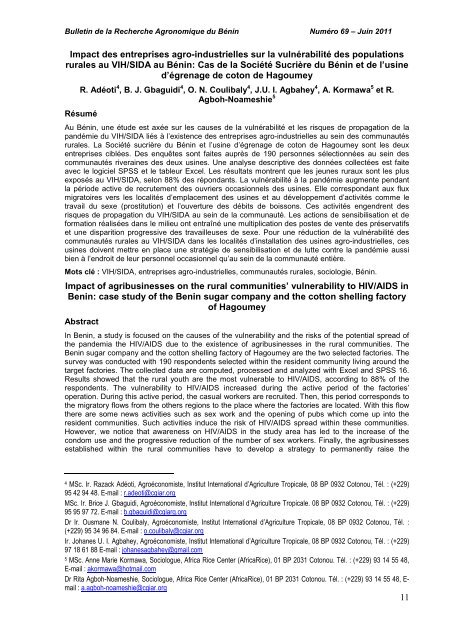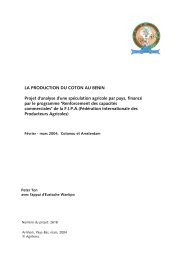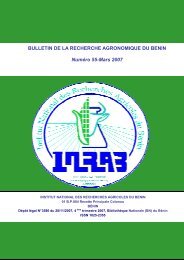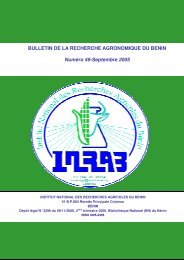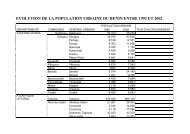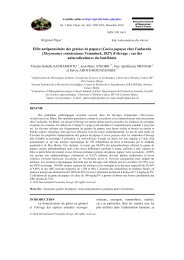Lien externe ou de téléchargement - Slire
Lien externe ou de téléchargement - Slire
Lien externe ou de téléchargement - Slire
- No tags were found...
You also want an ePaper? Increase the reach of your titles
YUMPU automatically turns print PDFs into web optimized ePapers that Google loves.
Bulletin <strong>de</strong> la Recherche Agronomique du Bénin Numéro 69 – Juin 2011Impact <strong>de</strong>s entreprises agro-industrielles sur la vulnérabilité <strong>de</strong>s populationsrurales au VIH/SIDA au Bénin: Cas <strong>de</strong> la Société Sucrière du Bénin et <strong>de</strong> l’usined’égrenage <strong>de</strong> coton <strong>de</strong> Hag<strong>ou</strong>meyR. Adéoti 4 , B. J. Gbaguidi 4 , O. N. C<strong>ou</strong>libaly 4 , J.U. I. Agbahey 4 , A. Kormawa 5 et R.Agboh-Noameshie 5RésuméAu Bénin, une étu<strong>de</strong> est axée sur les causes <strong>de</strong> la vulnérabilité et les risques <strong>de</strong> propagation <strong>de</strong> lapandémie du VIH/SIDA liés à l’existence <strong>de</strong>s entreprises agro-industrielles au sein <strong>de</strong>s communautésrurales. La Société sucrière du Bénin et l’usine d’égrenage <strong>de</strong> coton <strong>de</strong> Hag<strong>ou</strong>mey sont les <strong>de</strong>uxentreprises ciblées. Des enquêtes sont faites auprès <strong>de</strong> 190 personnes sélectionnées au sein <strong>de</strong>scommunautés riveraines <strong>de</strong>s <strong>de</strong>ux usines. Une analyse <strong>de</strong>scriptive <strong>de</strong>s données collectées est faiteavec le logiciel SPSS et le tableur Excel. Les résultats montrent que les jeunes ruraux sont les plusexposés au VIH/SIDA, selon 88% <strong>de</strong>s répondants. La vulnérabilité à la pandémie augmente pendantla pério<strong>de</strong> active <strong>de</strong> recrutement <strong>de</strong>s <strong>ou</strong>vriers occasionnels <strong>de</strong>s usines. Elle correspondant aux fluxmigratoires vers les localités d’emplacement <strong>de</strong>s usines et au développement d’activités comme letravail du sexe (prostitution) et l’<strong>ou</strong>verture <strong>de</strong>s débits <strong>de</strong> boissons. Ces activités engendrent <strong>de</strong>srisques <strong>de</strong> propagation du VIH/SIDA au sein <strong>de</strong> la communauté. Les actions <strong>de</strong> sensibilisation et <strong>de</strong>formation réalisées dans le milieu ont entraîné une multiplication <strong>de</strong>s postes <strong>de</strong> vente <strong>de</strong>s préservatifset une disparition progressive <strong>de</strong>s travailleuses <strong>de</strong> sexe. P<strong>ou</strong>r une réduction <strong>de</strong> la vulnérabilité <strong>de</strong>scommunautés rurales au VIH/SIDA dans les localités d’installation <strong>de</strong>s usines agro-industrielles, cesusines doivent mettre en place une stratégie <strong>de</strong> sensibilisation et <strong>de</strong> lutte contre la pandémie aussibien à l’endroit <strong>de</strong> leur personnel occasionnel qu’au sein <strong>de</strong> la communauté entière.Mots clé : VIH/SIDA, entreprises agro-industrielles, communautés rurales, sociologie, Bénin.Impact of agribusinesses on the rural communities’ vulnerability to HIV/AIDS inBenin: case study of the Benin sugar company and the cotton shelling factoryof Hag<strong>ou</strong>meyAbstractIn Benin, a study is focused on the causes of the vulnerability and the risks of the potential spread ofthe pan<strong>de</strong>mia the HIV/AIDS due to the existence of agribusinesses in the rural communities. TheBenin sugar company and the cotton shelling factory of Hag<strong>ou</strong>mey are the two selected factories. Thesurvey was conducted with 190 respon<strong>de</strong>nts selected within the resi<strong>de</strong>nt community living ar<strong>ou</strong>nd thetarget factories. The collected data are computed, processed and analyzed with Excel and SPSS 16.Results showed that the rural y<strong>ou</strong>th are the most vulnerable to HIV/AIDS, according to 88% of therespon<strong>de</strong>nts. The vulnerability to HIV/AIDS increased during the active period of the factories’operation. During this active period, the casual workers are recruited. Then, this period corresponds tothe migratory flows from the others regions to the place where the factories are located. With this flowthere are some news activities such as sex work and the opening of pubs which come up into theresi<strong>de</strong>nt communities. Such activities induce the risk of HIV/AIDS spread within these communities.However, we notice that awareness on HIV/AIDS in the study area has led to the increase of thecondom use and the progressive reduction of the number of sex workers. Finally, the agribusinessesestablished within the rural communities have to <strong>de</strong>velop a strategy to permanently raise the4 MSc. Ir. Razack Adéoti, Agroéconomiste, Institut International d’Agriculture Tropicale, 08 BP 0932 Coton<strong>ou</strong>, Tél. : (+229)95 42 94 48. E-mail : r.a<strong>de</strong>oti@cgiar.orgMSc. Ir. Brice J. Gbaguidi, Agroéconomiste, Institut International d’Agriculture Tropicale. 08 BP 0932 Coton<strong>ou</strong>, Tél. : (+229)95 95 97 72. E-mail : b.gbaguidi@cgiarg.orgDr Ir. Ousmane N. C<strong>ou</strong>libaly, Agroéconomiste, Institut International d’Agriculture Tropicale, 08 BP 0932 Coton<strong>ou</strong>, Tél. :(+229) 95 34 96 84. E-mail : o.c<strong>ou</strong>libaly@cgiar.orgIr. Johanes U. I. Agbahey, Agroéconomiste, Institut International d’Agriculture Tropicale, 08 BP 0932 Coton<strong>ou</strong>, Tél. : (+229)97 18 61 88 E-mail : johanesagbahey@gmail.com5 MSc. Anne Marie Kormawa, Sociologue, Africa Rice Center (AfricaRice), 01 BP 2031 Coton<strong>ou</strong>. Tél. : (+229) 93 14 55 48,E-mail : akormawa@hotmail.comDr Rita Agboh-Noameshie, Sociologue, Africa Rice Center (AfricaRice), 01 BP 2031 Coton<strong>ou</strong>. Tél. : (+229) 93 14 55 48, E-mail : a.agboh-noameshie@cgiar.org11


